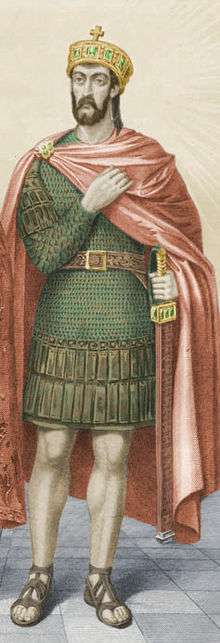Archil of Kakheti
| Archil | |
|---|---|
 St. Archil by Mikhail Sabinin | |
| Erismtavari of Kartli / Prince of Kakheti | |
| Reign | 736–786 |
| Predecessor | Stephen of Kakheti |
| Successor | Juansher of Kakheti |
| Born | Kingdom of Iberia |
| Died | 786 |
| Issue |
Juansher of Kakheti Prince Ioane Princess Gurandukht Princess Mariam Princess Mirandukht Princess Susan |
| Dynasty | Chosroid dynasty |
| Father | Stephen of Kakheti |
| Religion | Georgian Orthodox Church |
Prince Archil the Martyr (Georgian: არჩილი) was an 8th-century Georgian Orthodox Christian royal prince of the eastern Georgian region of Kakheti who was executed by the Arabs for having refused to convert to Islam. Historians are divided as to the years of his activity and death, but Professor Cyril Toumanoff of Georgetown University has relatively reliably established 736 to 786 as the period of his princely rule.
Life
Archil's biography is related in the medieval corpus of Georgian chronicles known as The Life of Kartli. One of its parts, the c. 800 history by Pseudo-Juansher, terminates with a brief account of Archil's tenure as prince, while another one – The Martyrdom of Archil,[1] a brief text of uncertain age (between early 9th and late 11th centuries) inserted just after Ps.-Juansher’s chronicle – narrowly focuses on Archil's martyrdom.[2]
Archil was a scion of the former royal dynasty of Iberia (Kartli), the Chosroid dynasty and a son of Prince Stephen of Kakheti (r. 685-736). His rule coincided with the Arab conquests in Caucasia. The 735-737 expedition by Marwan ibn Muhammad forced Archil and his brother Mirian to flee to the west through Egrisi into Abasgia where they joined the local dynast Leon I in the defense of Anacopia against the invading Arabs. Returning to Kakheti, Archil launched a program of reconstruction and Christianization of his mountainous pagan subjects. The Georgian texts also relate the rise of the Georgian Bagratids, a future royal dynasty, during the time of Archil.
Around 786, eastern Georgia was subjected to another Arab invasion, this time led by Khuzayma b. Khazim, who had been reconfirmed as viceroy of Arab-controlled Caucasia (Armīniya) by the caliph al-Hadi (r. 785-786). Archil, in an untenable situation, pleaded for peace. Khuzayma b. Khazim promised Archil gifts in return for his acceptance of Islam, but the prince refused and was condemned to prison. Then the viceroy was informed of Archil being a descendant of the Chosroid kings who allegedly knew the location of a treasure hidden by the Byzantine emperor Heraclius while evacuating Caucasia in the 620s. Ibn Khazim intensified his effort to win Archil over to Islam and promised to make him "general" and "king", but when realized that his efforts were in vain, he had the prince beheaded.
Archil has been canonized by the Georgian Orthodox Church which commemorates him on June 21 (N.S. July 4).[3]
Family
Archil was survived by two sons, Juansher and Iovane (John) and four daughters: Guarandukht, Mariam, Mirandukht and Shushan. Upon Archil’s death, Iovane evacuated to Egrisi while Juansher remained in Kakheti[4] and later married Princess Latavri of Tao-Klarjeti of Bagrationi dynasty.
Notes
- ↑ In surviving manuscripts the title is given as The Passion of the Holy and Glorious Martyr Archil, King of Kartli (წამებაჲ წმიდისა და დიდებულისა მოწამისა არჩილისი, რომელი ესე იყო მეფე ქართლისაჲ, ts'amebay ts'midisa da didebulisa mots'amisa archilisi, romeli ese ik'o mepe k'art'lisay). Though the title of the work identifies its subject as "the king of Kartli", the text itself does not directly refer to Archil as "king" and this title is not apparently used here in a literary sense. Rapp, p. 471.
- ↑ Rapp, p. 474.
- ↑ Machitadze, Archpriest Zakaria (2007) Holy Royal Martyrs Archil and Luarsab. The Lives of the Georgian Saints. Retrieved from Pravoslavie.Ru on November 11, 2007.
- ↑ Rapp, pp. 474-5.
References
| Wikimedia Commons has media related to Archil of Kakheti. |
- Rapp, Stephen H. (2003), Studies In Medieval Georgian Historiography: Early Texts And Eurasian Contexts
- Toumanoff, Cyril (1963). Studies in Christian Caucasian History, pp. 394–95. Washington DC: Georgetown University Press
| Preceded by Stepanoz II |
Prince of Kakheti 736–786 |
Succeeded by Juansher |